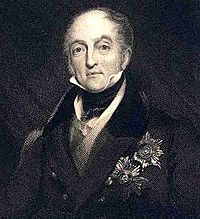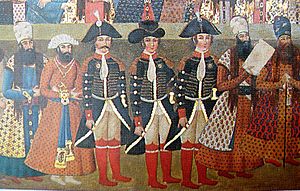Gore Ouseley facts for kids
Quick facts for kids
Sir Gore Ouseley, Bt
|
|
|---|---|

Sir Gore Ouseley with two distinguished orders
|
|
| Born | 24 June 1770 |
| Died | 18 November 1844 (aged 74) Beaconsfield, Buckinghamshire
|
| Occupation | Trader, diplomat and linguist |
| Spouse(s) | Harriet Georgina Whitelocke |
| Children | Four sons (two in India, two in England), three daughters, inc. Frederick Ouseley |
| Parent(s) | Captain Ralph Ouseley |
Sir Gore Ouseley (born June 24, 1770 – died November 18, 1844) was an amazing British person. He was a businessman, knew many languages, and worked as a diplomat. This means he helped countries talk to each other. He was born in 1770 and passed away in 1844 in Beaconsfield, England. One of his biggest achievements was helping to create a very important treaty between Russia and Persia in 1813. This treaty changed their borders.
Contents
Early Life and Family
Sir Gore Ouseley was born in Limerick, Ireland. His parents were Ralph and Elizabeth Ouseley. The Ouseley family originally came from Shropshire, England. Gore and his brothers, William and Gideon, were taught at home. All three of them grew up to have important careers.
Time in India
Gore Ouseley worked for the British Government in Lucknow, India. He became good friends with the local ruler, Nawab Saadat Ali Khan II. Gore Ouseley helped build a beautiful palace called Dilkusha Kothi. It was located by the River Gomti near Lucknow. This palace looked like a grand English house called Seaton Delaval Hall.
The palace stood for about 50 years. It was later damaged during the Siege of Lucknow. Gore Ouseley became a Major-Commander in India. He was given the title of "baronet" in 1808. This was a special honor recommended by Lord Wellesley. While in India, he had two sons, William Martin Claude Ouseley and Ralph Ouseley.
Diplomat in Persia

From 1810, Sir Gore Ouseley served as the ambassador to Persia. An ambassador is a country's official representative in another country. He worked on important agreements, especially between Persia and Russia. His brother, Sir William Ouseley, joined him as his secretary. Both brothers were very interested in studying Eastern cultures and languages.
Gore Ouseley was the first British ambassador to Persia since the 1600s. He supported the Persian ruler, Fat′h Ali Shah Qajar. He was very good at his job. He helped create the Treaty of Gulistan in 1813. This treaty officially made parts of modern-day Azerbaijan, Daghestan, and Eastern Georgia part of the Russian Empire.
During his time in Persia, Ouseley might have visited Persepolis. This is an ancient city in Persia. He later gave some ancient stone carvings from there to the British Museum in 1825.
Journey to Russia
After his brother went back to England in 1813, Gore Ouseley left Persia the next year. He stopped in St Petersburg, Russia. While in Russia, he received a high honor called the Grand Cordon of the Russian Order of St. Alexander Nevsky.
He also helped publish an early translation of the New Testament into Persian. A friend, Reverend Henry Martyn, had made the translation. Martyn died before he could publish it. So, Ouseley made sure the book was printed in St Petersburg. He even proofread it himself. This version was later improved and printed again in Calcutta, India.
Life in England
When Gore Ouseley returned to England in 1805, he expected to receive a higher title. However, he did not get it. He brought his two sons from India with him. He then married Georgina Whitelocke. They had six more children together.
His first son born in India, William Claude Ouseley, moved to Canada. He married Rosina Weeks there and his family still lives in Canada. Gore Ouseley's other son born in India, Ralph, became a doctor. He returned to India and sadly passed away there in 1823.
Gore Ouseley taught himself many languages. These included Sanskrit, Arabic, and Persian. He and his brother William loved studying Persia. William published many books about it. Gore's own books were published after he died.
In 1833, his family lived at Hall Barns. He enjoyed gardening and building, just like he did in India. In 1835, he held an important local position. He was the High Sheriff of Buckinghamshire.
In 1842, he became the President of a society that published books about Eastern cultures. He helped publish a famous Persian book called Gulistan of Sa'di. This book had a translation by Francis Gladwin.
There is a monument in his memory at Hertingfordbury Church in Hertfordshire. It was made by the sculptor Thomas Denman.
His collection of paintings from the Mughal Empire is now at the Bodleian Library in Oxford. These were given to the library in 1859.
His son, Frederick Arthur Gore Ouseley, became a famous English composer and musician.
Books Written
- Remarks on the Statistics and Political Institutions of the United States, 1832. This book was about the United States.
- Biographical Notices of Persian Poets, 1846. This book was published two years after he passed away.
Honors and Achievements
Sir Gore Ouseley received many honors during his life:
- He was made a Baronet in 1808. This is a special title.
- He became a member of the Privy Council in 1820. This is a group of advisors to the King or Queen.
- He was made a Knight Grand Cross of the Royal Guelphic Order in 1831.
- He also received honors from other countries. These included the Persian Order of the Lion and the Sun and the Russian Grand Cordon of the Order of St Alexander Nevsky.
- He was the High Sheriff of Buckinghamshire in 1835.
- He was a Fellow of the Royal Society. This is a group of important scientists.
- He was also a Fellow of the Society of Antiquaries. This group studies history and old things.
- He was the President of the Society for the Publication of Oriental Texts.
Images for kids
-
Banyan leaves and fruit – A watercolor from the collection of Gore Ouseley – now at Kew Gardens.
 | Kyle Baker |
 | Joseph Yoakum |
 | Laura Wheeler Waring |
 | Henry Ossawa Tanner |


